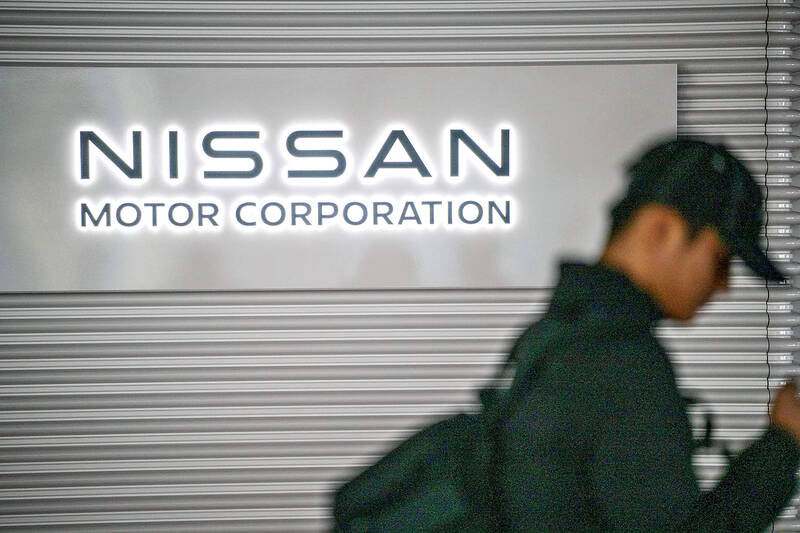Nissan Motor Co shares jumped after the Financial Times reported that a high-level Japanese group has drawn up plans to seek investment from Elon Musk’s Tesla Inc to aid the struggling automaker.
The group believes the electric vehicle (EV) maker is interested in acquiring Nissan’s plants in the US, the newspaper reported, citing people it did not identify.
The proposal envisions a consortium of investors, with Tesla as the largest backer, but also includes the possibility of a minority investment by Hon Hai Precision Industry Co (鴻海精密) to prevent a full takeover by the Apple supplier, the report said.

Photo: AFP
The group is being led by former Tesla board member Hiro Mizuno and supported by former Japanese prime minister Yoshihide Suga, the Financial Times reported.
Shares jumped more than 12 percent on the news of the potential investment.
A Nissan spokesperson declined to comment on the report. Tesla did not immediately respond to an e-mailed request for comment. Mizuno and a representative for Hon Hai did not immediately respond.
Nissan finds itself in need of a lifeline once again after a deal with Honda Motor Co to combine the two brands under a single holding company formally ended earlier this month. The fallout of the scrapped deal has been especially pointed for Nissan, which has seen weak sales, overcapacity, an outdated lineup of unpopular models and revolving-door leadership since the 2018 ouster of former Nissan CEO Carlos Ghosn.
That is putting pressure on the automaker to find support, and Nissan CEO Makoto Uchida has said it would be difficult to survive without leaning on a partnership.
Still, a deal with Tesla would be unexpected in part, because of the EV maker’s own struggles amid a market slowdown. Last month, it reported a drop in annual sales for the first time in more than a decade, and it has cut more than 10 percent of its workforce, including sales staff.
“For Tesla, it’s difficult to think there are any merits in buying Nissan,” Rakuten Investment Management Inc investment head Yasuhiko Hirakawa said. “It obviously has no need for legacy assets like engines and assembly lines. It’s difficult to imagine something Tesla needs that Nissan can offer.”
Despite Nissan’s challenges, its vast manufacturing operations and brand recognition are still enticing suitors.
Hon Hai has expressed renewed interest in Nissan after the deal with Honda collapsed, and Bloomberg News reported earlier this month that KKR & Co is weighing an investment in Nissan.
However, the carmaker continues to face risks from its restructure and the challenging geopolitical landscape. Moody’s Ratings on Friday cut its credit rating to speculative-grade and maintained a negative rating outlook.
“Whoever the buyer is, Nissan’s restructuring is unavoidable,” MCP Asset Management Japan strategist Rieko Otsuka said.

NEW IDENTITY: Known for its software, India has expanded into hardware, with its semiconductor industry growing from US$38bn in 2023 to US$45bn to US$50bn India on Saturday inaugurated its first semiconductor assembly and test facility, a milestone in the government’s push to reduce dependence on foreign chipmakers and stake a claim in a sector dominated by China. Indian Prime Minister Narendra Modi opened US firm Micron Technology Inc’s semiconductor assembly, test and packaging unit in his home state of Gujarat, hailing the “dawn of a new era” for India’s technology ambitions. “When young Indians look back in the future, they will see this decade as the turning point in our tech future,” Modi told the event, which was broadcast on his YouTube channel. The plant would convert

‘SEISMIC SHIFT’: The researcher forecast there would be about 1.1 billion mobile shipments this year, down from 1.26 billion the prior year and erasing years of gains The global smartphone market is expected to contract 12.9 percent this year due to the unprecedented memorychip shortage, marking “a crisis like no other,” researcher International Data Corp (IDC) said. The new forecast, a dramatic revision down from earlier estimates, gives the latest accounting of the ongoing memory crunch that is affecting every corner of the electronics industry. The demand for advanced memory to power artificial intelligence (AI) tasks has drained global supply until well into next year and jeopardizes the business model of many smartphone makers. IDC forecast about 1.1 billion mobile shipments this year, down from 1.26 billion the prior

People stand in a Pokemon store in Tokyo on Thursday. One of the world highest-grossing franchises is celebrated its 30th anniversary yesterday.

Zimbabwe’s ban on raw lithium exports is forcing Chinese miners to rethink their strategy, speeding up plans to process the metal locally instead of shipping it to China’s vast rechargeable battery industry. The country is Africa’s largest lithium producer and has one of the world’s largest reserves, according to the US Geological Survey (USGS). Zimbabwe already banned the export of lithium ore in 2022 and last year announced it would halt exports of lithium concentrates from January next year. However, on Wednesday it imposed the ban with immediate effect, leaving unclear what the lithium mining sector would do in the